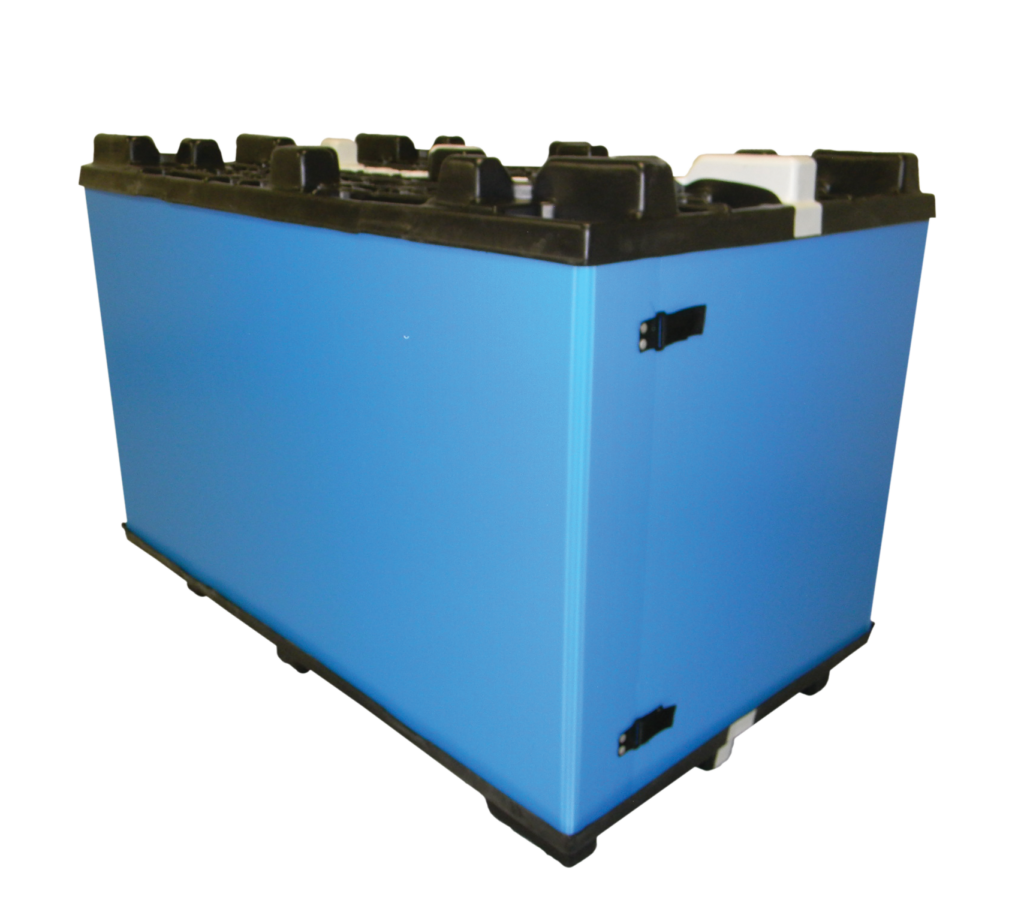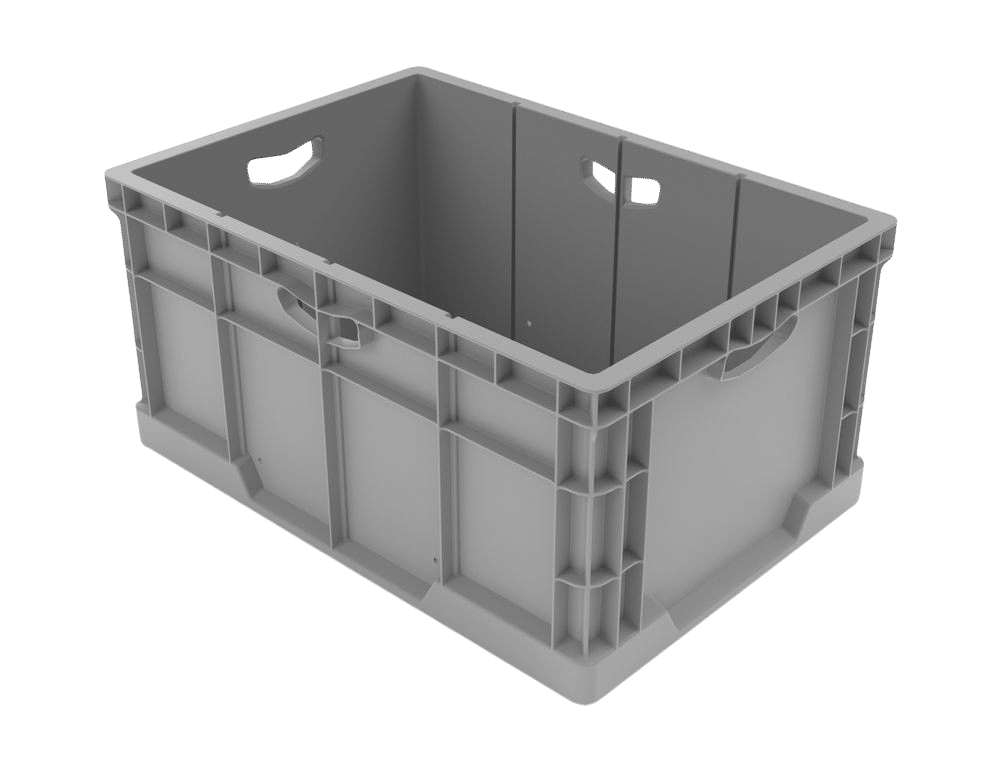As sustainability shifts from a buzzword to a core business strategy, industries are fundamentally rethinking packaging to reduce waste, improve efficiency, and meet environmental goals. Traditional, single-use packaging is a major contributor to landfill waste and represents a linear, “take-make-dispose” model. To break this cycle, companies are transitioning to circular solutions, with reusable dunnage emerging as an essential tool for modern supply chains.
Reusable dunnage refers to the durable, custom-engineered inserts, dividers, partitions, and protective layers used to secure products during transport and storage. Unlike disposable alternatives, it is designed for a long service life and multiple handling cycles. These solutions are crafted from a variety of robust yet lightweight materials, including specialized corrugated plastics, durable textiles, and engineered foams.
The core purpose of reusable dunnage is twofold: to provide superior and consistent protection for your products, and to create a closed-loop system that drastically reduces waste and lowers long-term costs. By embracing these resilient systems, businesses can achieve a powerful balance of operational excellence and environmental responsibility.
The Core Benefits of Reusable Dunnage
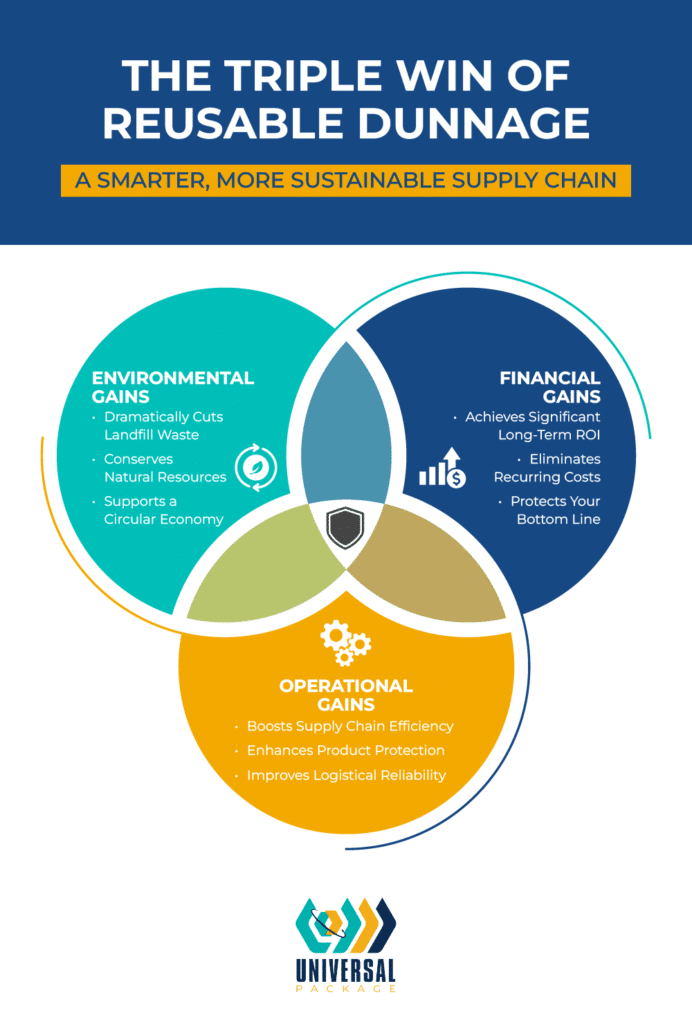

Adopting a reusable dunnage program delivers a powerful trifecta of advantages that extend far beyond simple packaging. By shifting to a circular, closed-loop model, businesses can unlock significant and interconnected environmental, financial, and operational gains that strengthen both their bottom line and their brand reputation as a sustainable leader.
Environmental Benefits
- Significant Waste Reduction: One of the most compelling reasons to adopt reusable dunnage is its direct impact on waste. Because the components are cycled through multiple uses instead of being discarded after a single trip, these solutions drastically reduce the volume of material sent to landfills, supporting zero-waste initiatives.
- Conservation of Natural Resources: This sustainable practice diminishes the demand for new, virgin raw materials. By reusing existing assets, companies lower the greenhouse gas emissions and the significant energy consumption that are associated with virgin material extraction and production.
- Alignment with Circular Economy Principles: By embracing reusability, businesses actively participate in the circular economy. This forward-thinking approach significantly reduces single-use plastic waste and contributes to cleaner logistics practices that benefit marine life and broader ecosystems.
Financial Benefits
- Strong Long-Term Return on Investment: While the upfront cost for custom reusable dunnage can be higher than for single-use alternatives, a careful analysis of the total lifecycle costs consistently reveals considerable long-term savings and a strong return on investment.
- Drastic Reduction in Recurring Expenses: The durability and extended lifecycle of these systems mean businesses benefit from a multitude of cost reductions, including lowering product damage during shipping, drastically reducing the need for frequent repurchases of disposable materials, and completely eliminating recurring waste disposal fees.
- Flexible and Adaptable Financial Models: To mitigate the initial investment, flexible leasing or rental programs can offer an attractive pathway for adapting to seasonal demand or new product launches. This makes reusable dunnage a financially appealing and agile option for many organizations without incurring heavy upfront capital costs.
Operational Benefits
- Maximized Space and Storage Efficiency: Reusable dunnage directly improves day-to-day logistics by streamlining storage and handling. Often engineered with precise stackability and modular configurations, these solutions are designed to maximize space utilization in shipping containers, trucks, and valuable warehouse floor space.
- Enhanced Product Protection and Load Stability: The uniformity and custom fit of the dunnage create superior load stability during transit. This precise engineering minimizes product movement, vibrations, and the risk of damage, leading to fewer customer returns and a more reliable shipping process.
- Improved Logistical Predictability and Reliability: These operational improvements contribute to a more robust, predictable, and reliable transportation network. By reducing handling risks and potential delays, businesses can achieve greater operational consistency, which ultimately enhances overall customer satisfaction and strengthens supply chain integrity.
Versatile Applications and Customization
A one-size-fits-all approach rarely works in industrial packaging, where products vary immensely in size, shape, weight, and fragility. Reusable dunnage stands out precisely because of its adaptability, offering tailor-made solutions that can be engineered to meet the specific challenges of any application.
This ability to customize ensures that every component—from a tiny electronic sensor to a heavy automotive part—receives the exact protection it needs. This versatility is demonstrated across a wide range of industries:
- Automotive: In the demanding automotive sector, robust and heavy-duty solutions are essential. Custom-molded plastic trays and high-density foam inserts are engineered to secure sensitive parts and heavy components, preventing scratches, dents, and breakage during a complex supply chain journey. Manufacturers report that using this type of precisely fitted reusable dunnage leads to significant reductions in product damage, positively impacting repair and replacement costs.
- Electronics: For the electronics industry, safeguarding delicate devices from shock and vibration is paramount. Here, custom-engineered foam assemblies and anti-static plastic dividers provide consistent cushioning and protection for irregularly shaped or sensitive items. This custom approach drastically reduces the incidence of damage-related returns for expensive devices.
- Medical and Pharmaceutical: These highly regulated industries require more than just physical protection. Reusable dunnage solutions are designed with materials that can maintain sterility and withstand rigorous cleaning and sanitization protocols. The non-porous and durable nature of the materials ensures that packaging systems comply with strict health and safety standards trip after trip.
- Trade Shows and Events: Even specialized logistics for events benefit from customization. Lightweight yet durable corrugated plastic inserts and modular foam systems are used to secure fragile displays, AV equipment, and promotional materials during transit, ensuring they arrive at their destination in perfect condition.
The power of this customization lies in creating a packaging solution that perfectly fits the product, which minimizes movement and virtually eliminates the risk of damage. Furthermore, modular designs allow the dunnage to be easily reconfigured for different parts or loading requirements, optimizing space in warehouses and shipping containers without ever sacrificing protection.
A Practical Guide to Choosing the Right Solution
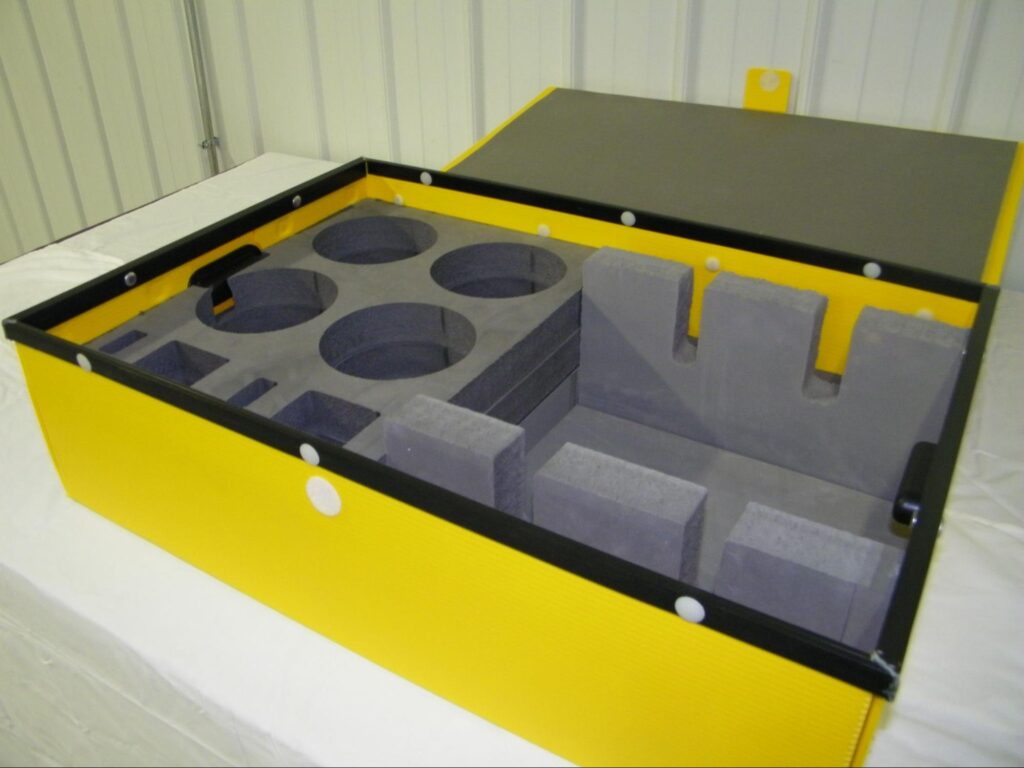
Choosing the right reusable dunnage is more than a simple purchase; it’s about designing a long-term asset for your business. The following practical considerations will guide you through the critical decisions around materials, cost, maintenance, and industry compliance.
Material Selection
The choice of material greatly impacts the performance and longevity of reusable dunnage. Considerations include weight, resistance to environmental factors such as moisture and temperature, and impact absorption. Matching the material to the specific handling and transportation requirements of a product is key to maximizing both performance and durability. For example, using engineered foams can significantly enhance shock absorption while maintaining a lightweight design.
Cost-Benefit Analysis
While upfront costs for reusable dunnage can be higher than for single-use alternatives, a careful analysis of total lifecycle costs usually reveals considerable savings. Reduced replacement rates, minimized damage, and lower waste disposal fees can all contribute to an attractive return on investment over time. Flexible leasing or rental options can also help distribute initial costs and provide adaptable solutions for varying operational needs.
Maintenance and Lifecycle Management
Regular maintenance is essential to ensure that reusable dunnage retains its protective capabilities over time. Companies should account for cleaning practices, repair services, and overall lifecycle management to maximize the lifespan of their packaging systems. Solutions that allow for periodic refurbishment rather than complete replacement promote sustainability by extending the useful life of materials.
Compliance with Industry Standards
Certain industries, such as medical and pharmaceutical sectors, require strict adherence to sanitation and sterility standards. When selecting reusable dunnage for these markets, it is crucial to ensure that the material and designs meet all necessary regulatory requirements, which can often be confirmed by certifications from recognized bodies.
The Future of Sustainable Packaging
While the benefits of reusable dunnage are clear, the path to widespread adoption involves navigating certain challenges and embracing exciting new trends. The future of sustainable packaging will be defined by how the industry addresses initial investment hurdles, adapts to evolving standards, and leverages technological innovation.
Initial Investment Considerations
The higher initial investment compared to single-use materials can be a barrier, particularly for small- and medium-sized enterprises. Despite this, strategic investments in reusable packaging are increasingly recognized for their cost-saving potential over time, as long-term efficiencies and reduced waste management expenses become evident.
Adapting to Evolving Standards
As regulatory standards around packaging and environmental practices continue to evolve, businesses must remain agile in adapting to new requirements. This may involve collaborating with industry groups and dedicating resources toward research and development to ensure ongoing compliance and maintain competitive sustainability practices.
Technological Innovations
Technological advancements are shaping the future of reusable packaging. Emerging tools, such as RFID tracking, can help optimize the use and maintenance of packaging materials. Innovations in material science are also leading to the development of new eco-friendly compounds that marry durability with reduced environmental impact.
These challenges, while notable, provide opportunities for innovation and set new benchmarks in sustainable logistics. As more industry leaders invest in the development of reusable dunnage, the adoption of these solutions is expected to grow, further solidifying their role in a more sustainable and efficient industrial landscape.
Implementing Reusable Dunnage in Your Operations
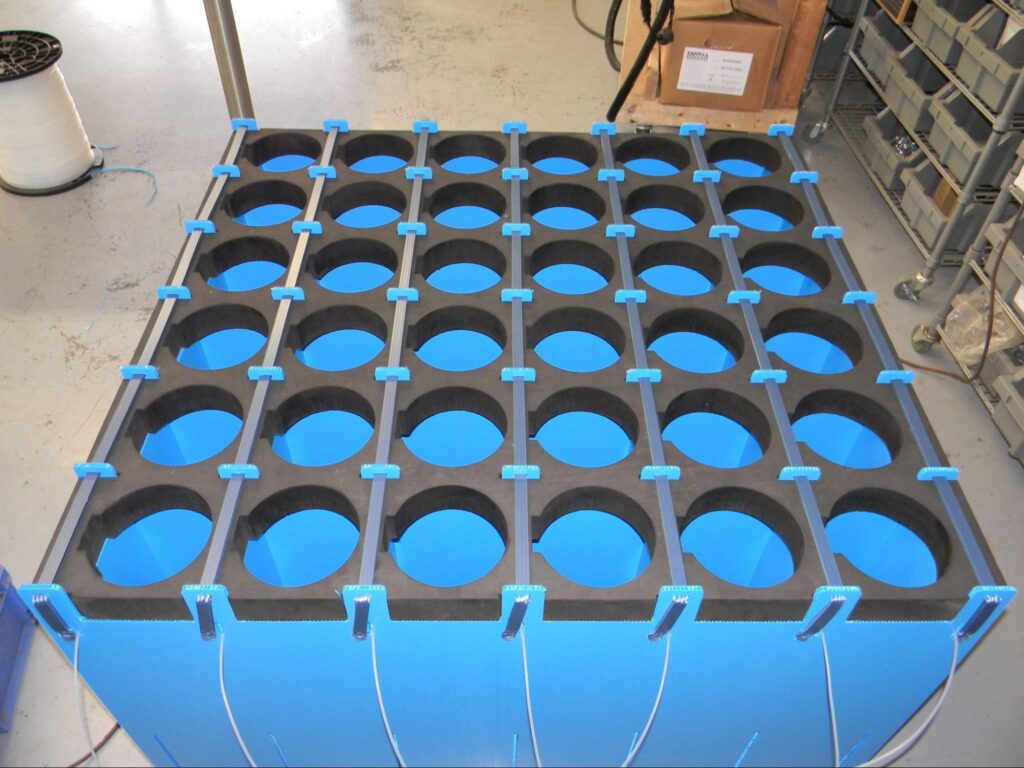
Transitioning to integrating reusable dunnage involves both selecting the right solutions and incorporating them into current operational practices. Companies might begin with a comprehensive review of existing packaging methods, identifying areas where damage occurs and inefficiencies exist. Pilot programs can play an essential role in testing new designs on a small scale before full implementation.
Training for staff on proper handling, cleaning, and maintenance of reusable dunnage is crucial to ensure that the cycle remains effective and efficient. Clear guidelines reduce risks such as cross-contamination or damage to the packaging materials, ensuring that the benefits of sustainability and operational transparency are fully realized.
Universal Package’s Commitment to Sustainable Packaging
Universal Package is committed to embracing sustainable practices and innovation in industrial packaging. The company focuses on creating custom-designed solutions that address a variety of industry needs, using a range of high-quality materials and offering services that promote the extended lifecycle of packaging systems. This approach aims to reduce environmental impact while enhancing operational efficiency and supporting long-term cost savings. In line with its values, Universal Package continuously evolves its strategies to contribute to responsible packaging and sustainability.
At Universal Package, we believe that advanced materials combined with expert design promote improved cost savings and a cleaner environment for all stakeholders. By continually developing innovative, reusable packaging solutions, we help businesses extend the lifespan of critical logistics equipment while driving greater returns on their investment.
Embrace the Sustainable Revolution in Packaging with Reusable Dunnage
Reusable dunnage is revolutionizing industrial packaging by offering a sustainable and cost-effective alternative to disposable materials. By integrating these solutions into your supply chain, your business can lower long-term costs, reduce waste, and ensure optimal protection for valuable goods. With adaptable options ranging from lightweight customized designs to robust heavy-duty solutions, reusable dunnage meets diverse operational needs while promoting environmental responsibility.
Contact Universal Package today to explore innovative reusable dunnage solutions tailored to your unique requirements and take a significant step toward a more efficient, sustainable future.


